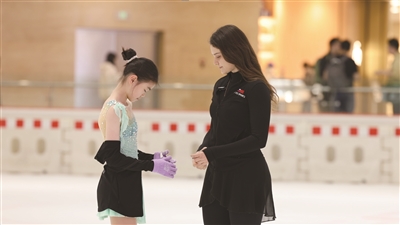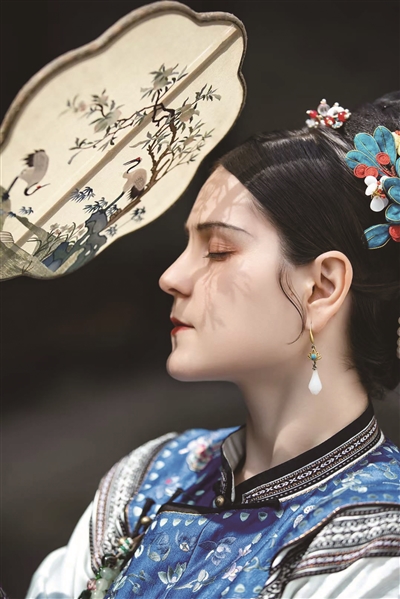
Anastasiia with her student on the rink during a class Photo: Xu Yaqi

Anastasiia wearing traditional Chinese attire Photo provided to Hangzhoufeel
Story
By Daria Fominykh
The Olympic Winter Games Beijing 2022 sparked an interest in winter sports across China. In Hangzhou, a city quick to embrace new trends, have you tried the latest popular activities? If not, after reading this article, you might be inspired to try ice skating, or even invest in lessons from Anastasiia Kutsenko, who teaches much more than skating techniques.
For most days, World Ice Arena, an Olympic-standard indoor ice skating rink at the Micx shopping mall in Shangcheng district, is bustling with activities. While some skate for fun, snapping photos and sipping bubble tea by the rink’s barrier, others are deeply aborbed in their training. They glide, jump, and yes, occasionally fall, only to get up and try again. Among the coaches, there is Anastasiia from Russia, guiding both novices and seasoned skaters alike.
Despite a large vertical poster featuring Anastasiia’s portrait, along with her titles and expertise, prominently hanging from the ceiling at the center of the rink, she keeps a low profile about her once being an ice skating athlete. However, she admits that having her accomplishments for everyone to see pushes her to work even harder to live up to her role as a representative of the Russian ice skating system in China.
When Anastasiia is teaching on the rink, she might look strict in her sleek black sports gear, hands clasped behind her back, eyes locked on her students. But watch her with the kids—she’s right there holding their hands to calm their nerves, or fixing a ponytail that’s undone. She values communication and care in her coaching.
“Look, we have two flags here,” she said, pointing to the Russian and Chinese flags on the logo printed on the chest of her sports jacket. Then she turned around to show a phrase on the back, reciting from memory, “‘We are building a bridge of sports communication between our countries’—that’s our motto.”Anastasiia mentioned that many Russians, including coaches and athletes, are eager to collaborate with China, but for many, it feels like uncharted territory, leaving them unsure of how to proceed.
Being a go-getter, she took just half a year to move to Hangzhou and start her work of sharing Russian ice skating knowledge and experience, which she believes allow collaboration between the two countries in ice skating to flourish.
Anastasiia offers comprehensive training. This means that classes aren’t limited to the ice; they also take place in the gym and on sports fields to build strength and endurance, in a dance studio to practice choreography, and in traditional classrooms for theoretical lessons, which might involve writing or even drawing. Perhaps most crucially, Anastasiia places a strong emphasis on her students’ mental well-being, a focus that stems from her own challenges when she was an athlete.
“Life is a journey,” Anastasiia noted. She indeed went through a long and winding path that shaped her as an ice skating coach. As a child, she strived to start practicing ice skating. She was physically talented but after achieving some early results, couldn’t quite tune her mind right. It was an eternal struggle with herself, her parents, and her coach, and nothing substantial came of it.
This unfulfilled potential eventually drove Anastasiia to become a coach. She made in-depth exploration into her thoughts and sought answers through other physical activities, and that is how she discovered yoga and Tai Chi, an internal Chinese martial art, which after years of practice, helped her obtain inner peace.
As a coach, Anastasiia emphasizes the need for such peace and concentration in ice skating, where coordinating the body’s movement requires being free from unnecessary thoughts and worries. “I teach them (students) to move for the sake of movement. That’s the biggest secret,” she explains, “Just like in Tai Chi: your eyes are open, but you look through objects because you’re focused on the movements.”
Anastasiia encourages her athletes to skate for themselves, not just to please their parents or coach, or to pass a test. “I teach my athletes to move simply for the joy of movement. This approach helps them enjoy what they’re doing more fully,” she says.
She also avoids putting unnecessary pressure on her students. Anastasiia explains that while figure skating is challenging, it’s just one part of life—a path that builds strength and discipline, potentially leading to more opportunities in the future. Hence, she does not push her students to focus solely on winning medals or taking tests, aiming instead to foster a broader developmental perspective.
Students’ parents have really noticed a difference, not just in how their kids perform on the ice, but also in their overall attitude. “The changes have really been significant,” Ms. Qi, a mother of a girl training with Anastasiia commented, “Not only has her (daughter’s) physical training improved—she is the fastest girl in her class at school, now even the boys can’t keep up—but her maturity and approach to learning have evolved. She now critically evaluates her own strengths and weaknesses, applying her time more effectively to her studies.”
What roles does someone who is truly passionate about their work can represent? In Anastasiia’s case, they are three in one: a coach, a mentor, and a cultural ambassador.
